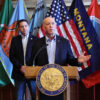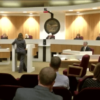Recent Supreme Court Term Delivers Key Victories For Main Street
The U.S. Supreme Court recently wrapped up its 2023-2024 term and will be in recess until October 2024. During this term, the Court heard a number of cases that will have a significant impact on small businesses and the Main Street economy. NFIB filed amicus briefs in 12 of the cases presented. Of those, five were decided in favor of small businesses, including a monumental ruling that overturned Chevron.
“The Supreme Court considered several high stakes issues this term, especially for the small business community,” said Beth Milito, Executive Director of NFIB’s Small Business Legal Center. “Eliminating Chevron deference is a major step in limiting government overreach and providing small business owners with a level playing field to defend their rights. These victories will prevent the damaging effects of extraneous regulatory interference and harmful penalties and will protect the rights of current and future entrepreneurs.”
2023-2024 Wrap Up:
Loper Bright Enterprises v. Gina Raimondo (No. 22-451)
In a landmark ruling, the Court overturned a damaging precedent that had enabled federal agencies to enact and uphold onerous regulatory burdens for the last 40 years. The case concerned the judicial deference given to an agency’s interpretation of the law; a concept established in Chevron v. Natural Resources Defense Council. NFIB’s filed an amicus brief arguing against Chevron deference by examining the consequences of unchecked agency power and highlighting a more constitutionally appropriate alternative to the legislative indifference and judicial passivity that Chevron enabled. Agreeing, the Supreme Court held that courts must exercise independent judgment in deciding whether an agency acted within its statutory authority, instead of deferring to the agency.
Securities and Exchange Commission v. Jarkesy (No. 22-859)
This case questioned the constitutionality of the Securities and Exchange Commission’s (SEC) in-house enforcement proceedings. NFIB filed an amicus brief with the U.S. Chamber of Commerce arguing that the agency’s enforcement actions denied respondents their Seventh Amendment right to a jury trial. The Court upheld the ruling of the Fifth Circuit that the SEC’s in-house enforcement proceedings are unconstitutional. With this ruling, the Supreme Court prevented countless small businesses from being unconstitutionally penalized.
Sheetz v. County of El Dorado, California (No. 22-1074)
The case questioned whether the unconstitutional conditions doctrine applies to legislatively-imposed building permit exactions. In this case, a California property owner sought to build a manufactured house on his land and obtain the necessary permit. In exchange for the permit, the County imposed a monetary exaction over $23,000 in order to finance road improvements in the county. Because the exaction was authorized by legislation, lower courts held that it was not an unconstitutional condition. NFIB’s amicus brief, which was filed with The Buckeye Institute, argued that the Fifth Amendment’s Takings Clause does not distinguish between unconstitutional conditions imposed by administrative personnel and those imposed by legislative bodies. Thankfully, the Court agreed.
Corner Post, Inc. v. Board of Governors of the Federal Reserve System (No. 22-1008)
This case questioned when the six-year statute of limitations to challenge an agency rule under the Administrative Procedure Act (APA) begins. NFIB filed an amicus brief in the case, which argued that publication of a final agency rule cannot injure nonexistent entities and that newly formed entities are not injured by an agency’s final rule until they are in operation and subject to the rule. The Court agreed, holding that the injury and finality requirements to sue under the APA are distinct.
Starbucks Corporation v. M. Kathleen McKinney (No. 23-367)
The case concerned the National Labor Relations Board’s (NLRB) requests for injunctions under the National Labor Relations Act (NLRA). The question was whether these requests are subject to the traditional four-factor test for preliminary injunctions or a more lenient standard. NFIB filed an amicus brief with the U.S. Chamber of Commerce and the National Association of Manufacturers arguing that the lenient standard resulted in extreme deference to the NLRB, allowing the agency to engage in substantial and unchecked interference with small businesses. The Court agreed and ruled that the NLRB must satisfy the more demanding preliminary injunction test before inserting itself into the livelihood of small business owners.
The NFIB Small Business Legal Center protects the rights of small business owners in the nation’s courts. NFIB is currently active in more than 40 cases in federal and state courts across the country and in the U.S. Supreme Court.











